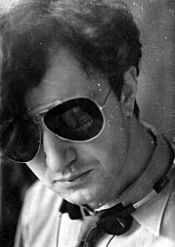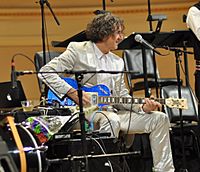Goran Bregović facts for kids
Quick facts for kids
Goran Bregović
|
|
|---|---|
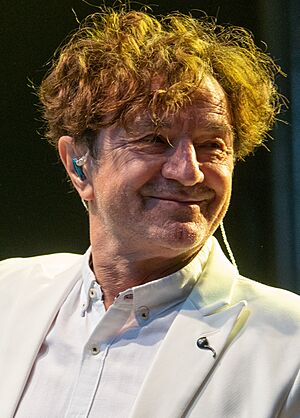
Bregović in 2022
|
|
| Born | 22 March 1950 |
| Nationality | Yugoslav |
| Other names | Brega |
| Occupation |
|
| Years active | 1969–present |
| Spouse(s) |
Dženana Sudžuka
(m. 1993) |
| Children | 4 |
| Musical career | |
| Genres | |
| Instruments |
|
| Associated acts |
|
Goran Bregović (Serbian Cyrillic: Горан Бреговић; born 22 March 1950) is a famous musician and composer from Bosnia and Herzegovina. He is known around the world, especially in the Balkan countries. He has played at famous places like Carnegie Hall and Royal Albert Hall.
Goran grew up in Sarajevo. He started in bands like Kodeksi and Jutro. He became very famous as the main songwriter and lead guitarist for Bijelo Dugme. This band was one of the most popular and important music groups in former Yugoslavia. After Bijelo Dugme broke up, Goran started his own successful music projects. He also began writing music for movies.
Some of his most famous movie music was for three films by Emir Kusturica: Time of the Gypsies, Arizona Dream, and Underground. For Time of the Gypsies, Goran won an award in 1990. He also wrote music for the movie La Reine Margot, which was nominated for an Academy Award. Another film he composed for was The Serpent's Kiss.
Over his long career, Goran has written music for many well-known singers. These include Sezen Aksu, Kayah, Iggy Pop, and Cesária Évora.
Contents
Early Life and Education
Goran Bregović was born in Sarajevo, which was part of Yugoslavia at the time. His father, Franjo Bregović, was Croatian, and his mother, Borka Perišić, was Serbian. Goran has two younger siblings, Dajana and Predrag. His father's family was from a village near Križevci in Croatia. His mother's family came from a village near Gacko in Bosnia.
Goran's maternal grandfather fought in World War I. After the war, he received land in Slavonia and moved his family there. During World War II, Goran's grandfather joined the Partisans. His grandmother, two uncles, an aunt, and his mother were taken to a camp. They were later exchanged for captured Germans. The family then went to Serbia.
Goran's father also fought with the Partisans in World War II. After the war, he went to a military school in Virovitica. There, he met Goran's mother. His father then got a job teaching in Sarajevo, so they moved there. Goran was born in Sarajevo in 1950.
Goran's parents divorced when he was 10 years old. He stayed with his mother in Sarajevo. His father moved to Livno with Goran's younger brother, Predrag. Goran would visit them every summer. Later, his father moved back to his home village. Predrag also returned to Sarajevo for university.
Goran started playing the violin in music school. But he was told he wasn't very good and left the school. His friends taught him music instead. Later, his mother bought him his first guitar. Goran wanted to go to an art high school. But his mother sent him to a technical school instead. As a compromise, she let him grow his hair long.
Starting His Music Career
When Goran started high school, he joined a band called Izohipse. He played bass guitar. He later left that school. Then he went to grammar school and joined another band called Beštije. He was still a bass guitar player. When he was 16, his mother moved away. Goran had to take care of himself. He played folk music in a restaurant and worked other jobs to earn money.
In 1969, Željko Bebek saw Goran play with Beštije. Željko invited Goran, who was 18, to play bass in his band, Kodeksi. Goran happily joined.
Kodeksi Band
The band Kodeksi changed its members and instruments. By summer 1970, Goran played lead guitar. The band included Goran Bregović, Željko Bebek, Zoran Redžić, and Milić Vukašinović. All of them would later join Bijelo Dugme. At this time, they were inspired by bands like Led Zeppelin. Željko Bebek left the band in late 1970. Goran's mother and Zoran's brother brought them back to Sarajevo from Naples.
Jutro Band
In autumn 1971, Goran started studying philosophy and sociology at the University of Sarajevo. But he soon left. Milić Vukašinović went to London. So, Goran formed a new band with Nuno Arnautalić called Jutro (Morning). Zoran Redžić also joined. The band's members changed often over the next few years. On January 1, 1974, they changed their name to Bijelo Dugme ("White Button").
Bijelo Dugme: A Famous Band
From 1974 to 1989, Goran Bregović was the lead guitarist and main creative person behind Bijelo Dugme. For many years, they were one of the most popular bands in Yugoslavia. Goran was the band's leader and made most of the decisions. He was also the public face of the band in the media.
Bijelo Dugme tried to become famous outside of Yugoslavia. In 1975, they recorded an English song called "Playing the Part" in London. It was a promotional song but was never widely released.
The band had more success touring in Eastern European countries. They toured Poland in April 1977, playing nine concerts. They also filmed a TV special there. Later that year, Goran went to serve his mandatory time in the Yugoslav army. He was away from music for a year, and the band took a break.
In early 1982, Bijelo Dugme played in Innsbruck, Austria. They represented Sarajevo, which was hosting the Winter Olympics. In summer 1982, the band toured Bulgaria. They played 41 shows.
In summer 1985, Bijelo Dugme was finally allowed to play in Moscow, Russia. They were scheduled to play at Gorky Park. However, the event was stopped due to too many people. Two days later, they played at the Dynamo Arena instead.
Other Music Projects
Between Bijelo Dugme's albums and tours, Goran worked on other projects. He released a solo album in 1976. He also wrote music for two movies: Leptirov oblak (1977) and Lične stvari (1979).
He also helped produce music for other artists. He produced a single for the band Idoli in 1980. He also co-produced an album for Zdravko Čolić in 1981.
Goran played guitar on many songs for other Yugoslav pop, folk, and rock artists. These included Neda Ukraden, Hanka Paldum, Riblja Čorba, and Dino Merlin.
Goran also got involved in the business side of music. In 1984, he and Zdravko Čolić started their own music label called Kamarad. This was unusual in a communist country at the time. Kamarad helped release Bijelo Dugme's and Zdravko Čolić's albums.
Solo Career and Movie Music
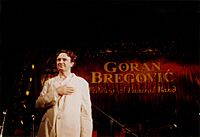
In the late 1980s, Goran started writing music for movies. His first big movie project was Emir Kusturica's Time of the Gypsies (1989). Both the movie and the music were very successful. Goran continued to work with Kusturica. He composed music for Arizona Dream (1993), which featured Iggy Pop. During the Bosnian War, Goran moved to Paris. He also lived in Belgrade.
His music for the movie Queen Margot was also a big hit. The film won awards at the Cannes Film Festival in 1994. The next year, the movie Underground won a top award, and Goran wrote its music.
In 1997, he worked with Turkish singer Sezen Aksu on her album Düğün ve Cenaze (Wedding and Funeral). After that, he kept making albums with other musicians. These albums used his music with their lyrics.
He made an album with George Dalaras in 1999. In the same year, Goran recorded Kayah i Bregović with Polish singer Kayah. This album sold over 700,000 copies in Poland. In 2001, he made another album with Polish singer Krzysztof Krawczyk.
In 2005, Goran took part in three big farewell concerts for Bijelo Dugme.
Some of Goran's music is in the soundtrack for the 2006 film Borat: Cultural Learnings of America for Make Benefit Glorious Nation of Kazakhstan. His song "Đurđevdan" is especially well-known from the movie. Other songs by Bregović were used in the 2012 Brazilian TV show Salve Jorge.
The Wedding and Funeral Orchestra
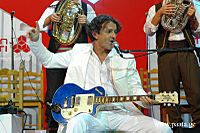
For many years, Goran Bregović has performed with a large group of musicians. This group is called the Wedding and Funeral Orchestra. It includes a brass band, string instruments, a male choir, and singers. Sometimes it has 40 people.
Since 1998, Goran has mostly performed his music in concerts around the world with this orchestra. The small version of the orchestra has 10 people. The large version has 37 people, but this number can change.
Since 2012, the small orchestra has 9 people. The large orchestra has 19 people. They played in New York at the Lincoln Center in July 2016.
The small orchestra includes Muharem "Muki" Rexhepi (vocals, drums), Bokan Stanković (first trumpet), Dragić Velićović (second trumpet), Stojan Dimov (sax, clarinet), Aleksandar Rajković (first trombone), Miloš Mihajlović (second trombone), and Bulgarian female singers Daniela Radkova-Aleksandrova and Ljudmila Radkova-Trajkova. Goran himself also performs.
The large orchestra also includes a string quartet and a sextet of male voices. In 2013, Goran toured Asia and Australia. He performed with a string quartet, a male choir, Bulgarian singers, and half of a brass band. The other parts of the brass band were played from his computer. In 2017, he was a guest artist on the song "El Futuro Es Nuestro" by rapper Residente.
Eurovision Performances
Goran Bregović performed during the break at the Eurovision 2008 final in Belgrade, Serbia. He also wrote the Serbian song for the Eurovision Song Contest 2010, called 'Ovo Je Balkan'. It was sung by Milan Stanković.
Musical Style
Goran Bregović's music is inspired by Balkan sounds. He mixes these with European classical music and Balkan rhythms.
His music combines different styles from Yugoslavia, Bulgaria, Roma people, Greece, Romania, Albania, Italy, Turkey, and Poland. It is a mix of popular music, traditional polyphonic music from the Balkans, tango, and brass band music.
Personal Life
Goran Bregović has four children. His first daughter, Željka, was born in the early 1970s. Željka lives in Austria and has a daughter named Bianca, who is Goran's granddaughter.
In 1993, Goran married his long-time girlfriend, Dženana Sudžuka. She was a model. Their wedding was in Paris. The film director Emir Kusturica was Goran's best man.
Goran and Dženana have three daughters: Ema (born 1995), Una (born 2002), and Lulu (born 2004). Since the early 1990s, Goran has lived mainly in Paris when he is not touring. His three daughters were born and grew up there. He also spends a lot of time in Belgrade for his music work. He once said that his home is where he keeps his coats in summer and swimsuits in winter, referring to his Paris apartment.
In June 2008, Goran had an accident in Belgrade. He fell from a cherry tree in his garden. He recovered quickly after surgery. Within a month, he performed two big concerts in New York City.
Goran's brother, Predrag, lives in New York City. His sister, Dajana, lives in Split, Croatia.
Views on Unity
In 1971, Goran Bregović was a student and joined the Yugoslav Communist League. He often spoke about supporting communist ideas.
In 1990, when Yugoslavia's political system changed, Goran supported Ante Marković's Union of Reform Forces of Yugoslavia. This party wanted to reform communism into a market economy and opposed ethnic nationalism. Goran used his fame to help with their election campaign.
In April 1999, during the NATO bombing of Yugoslavia, Goran played at an anti-war concert in Thessaloniki, Greece. Other Balkan artists also performed.
After the Yugoslav Wars, Goran has said he feels "Yugonostalgic." This means he misses the idea of Yugoslavia. In 2009, he said: "Yugoslavia is where many worlds meet: Orthodox, Catholic, Muslim. With music, I don't have to represent anyone, except myself – because I speak the first language of the world, the one everyone understands: music."
Properties and Homes
Goran Bregović owns properties in different places around the world. He spends most of his time between Belgrade, where he records music, and Paris, where his wife and daughters live.
He reportedly owns homes in Paris, Istanbul, Belgrade, Zagreb, on Mount Jahorina, and in Perast. Many of these properties are used for business, like renting to tourists or for recording and filming.
In Belgrade, Goran owns several properties in the nice Senjak neighborhood. Some of his Belgrade properties have been used as filming locations for Serbian TV shows.
Movie Music List
- 1977 – Butterfly cloud (Leptirov oblak)
- 1979 – Personal Affairs (Lične stvari)
- 1988 – Time of the Gypsies (Dom za vešanje)
- 1989 – Kuduz
- 1990 – Silent Gunpowder (Gluvi barut)
- 1991 – The Serbian Girl (Das Serbische Mädchen)
- 1991 – The Little One (Mala)
- 1991 – Čaruga
- 1993 – Arizona Dream
- 1993 – Toxic Affair
- 1993 – La Nuit sacrée
- 1993 – Le Nombril du monde
- 1993 – Kika
- 1994 – soundtrack for La Reine Margot
- 1995 – Underground
- 1997 – Music for Weddings and Funerals (Musik för bröllop och begravningar)
- 1997 – A Chef in Love (Shekvarebuli kulinaris ataserti retsepti)
- 1997 – The Serpent's Kiss
- 1997 – XXL
- 1998 – Train de Vie
- 1999 – The Lost Son
- 1999 – Tuvalu
- 1999 – Operation Simoom (Operacja Samum)
- 2000 – 27 Missing Kisses
- 2000 – Je li jasno prijatelju?
- 2005 – The Turkish Gambit (Турецкий гамбит)
- 2005 – I giorni dell'abbandono
- 2006 – Karaula
- 2006 – Le Lièvre de Vatanen
- 2006 – Borat: Cultural Learnings of America for Make Benefit Glorious Nation of Kazakhstan (non-original music; "Ederlezi" from Dom za vešanje)
- 2007 – Fly by Rossinant
- 2008 – Mustafa
- 2011 – Baikonur
Discography
With Bijelo dugme
Original Movie Soundtracks
- 1988: Time of the Gypsies
- 1989: Kuduz
- 1993: Toxic affair
- 1993: Arizona Dream
- 1994: La Reine Margot
- 1995: Underground
- 1995: A Chef in Love
- 2000: Tuvalu with Jürgen Knieper
- 2005: I giorni dell'abbandono with Carmen Consoli
- 2006: Le Lièvre de Vatanen
- 2008: Mustafa
Music Compilations
- 1996: PS
- 1998: Ederlezi
- 1999: Magic book
- 2000: Songbook
- 2000: Music for films
- 2009: Welcome to Bregović
Other Albums
- 1976: Goran Bregović
- 1991: Paradehtika with Alkistis Protopsalti
- 1997: Düğün ve Cenaze with Sezen Aksu
- 1997: Thessaloniki – Yannena with Two Canvas Shoes with George Dalaras
- 1998: Silence of the Balkans, live in Thessaloniki
- 1999: Kayah & Bregović with Kayah
- 2000: Balkanica with Athens Symphony Orchestra
- 2001: Krawczyk & Bregović Daj mi drugie życie with Krzysztof Krawczyk
- 2002: Tales and Songs from Weddings and Funerals
- 2007: Goran Bregović's Karmen with a Happy End
- 2009: Alkohol: Šljivovica & Champagne
- 2012: Ederlezi x Four
- 2012: Champagne for Gypsies
- 2017: Three Letters from Sarajevo, Opus 1
Guest Performances
- 2017: "El Futuro Es Nuestro" (Residente), by Residente
Awards and Recognition
- On June 31, 2006, he received a copy of the key to the city of Tirana, Albania.
- In 2021, he was given the Order of Karađorđe's Star by the President of Serbia.
Images for kids
See also
 In Spanish: Goran Bregović para niños
In Spanish: Goran Bregović para niños
 | Anna J. Cooper |
 | Mary McLeod Bethune |
 | Lillie Mae Bradford |


